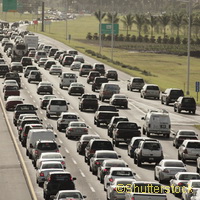Transport solutions for the future of the economy and environment
Traffic congestion is a serious problem. According to a recent study conducted by INRIX Europe, Belgium is the worst country in Europe for congestion, with motorists spending 55 hours a year in traffic jams, followed by Holland (50 hours) and Italy (29 hours). It is estimated that by 2050 the world's roads could see 4 billion vehicles: four times today's figure. How to tackle the problem of traffic congestion was recently discussed at the Intelligent Transport Systems World Conference in Vienna, which was organised by the European Commission. One topic was how to avoid a global gridlock (in response to the news of a traffic jam in China, which lasted 11 days). The answer, it seems, lies in smarter solutions for transport - not only for those stuck in traffic but for the economic and environmental future as well. Neelie Kroes, Vice-President of the European Commission responsible for the Digital Agenda, told those at the conference that 'Seizing every technological opportunity possible is the way forward. Especially for road transport, of all kinds: passenger and freight; short distance and long; urban and rural; four-wheelers, two-wheelers, eighteen-wheelers.' Although to do this she believes that 'We need to seize every technological opportunity we can get.' The Vice-President goes on to explain: 'A large part of the transformation of transport will have to come from new digital technology. New Information and Communication Technology (ICT) is changing everything. Already today we are seeing ICT-enabled innovations that change the way people drive; enabling new models like car sharing, and in the future, with every vehicle, every sensor plugged into the Internet we could have an electro-mobility revolution.' One such device that could soon be a reality is the eCall system, which alerts emergency services. If it were installed in all cars, it is estimated that 2,000 lives a year could be saved. The goal for the European Commission is to install this life-saving technology in all new cars and light vehicles, in all Member States, by the end of 2015. The European Innovation Partnership for Smart Cities and Communities, launched this year, is also set to break down boundaries between the sectors involved, making solutions adaptable, interoperable and deployable, and give administrations and citizens the tools and information needed to improve their lives. For 2013 alone, EUR 365 million in EU funds has been earmarked to demonstrate these kinds of urban technology solutions. However, the Vice-President of the European Commission says, 'To bring about this transformation, we need to continue to cooperate intensely. We will continue to work with international partners to ensure that European and non-European cars speak the same language. We are working most intensively with the US: but we're also looking further afield, like to Japan, China, Brazil, South Korea, Taiwan, Canada and Russia.' Today, under the Seventh Research and Development (R&D) Framework Programme (FP7), the European Commission is funding over 50 projects in areas such as automotive safety, energy efficiency and traffic management with an investment of EUR 350 million. Such projects include SUNSET, which is a transport, telecommunications and energy application. It has been devised to encourage people to travel more sustainably by using social networks and incentives to cut congestion, which aims to increase safety and protect the environment. With research on basic components, electronics and smart systems, the long-term investment is aimed at helping Europe to lead worldwide. This work is set to continue under a proposal for the next generation of EU research, Horizon 2020, with investment in smart, green and integrated transport. Vice-President Kroes concludes, 'Overall, I want us to benefit from economies of scale and scope; avoiding partial or fragmented solutions; unlocking business opportunity. And I don't just want technology to enable new inventions, new toys, and new gadgets. I want tomorrow's citizens to live in a society that's safer, stronger, and more sustainable. Information and Communication Technology (ICT) can help us do all that.'For more information, please visit:The European Commission:http://ec.europa.eu/transport/themes/its/index_en.htmThe 19th ITS World Congress in Vienna, Austria:http://2012.itsworldcongress.comINRIX Europe:http://www.inrix.com/europe.asp
Countries
Austria

